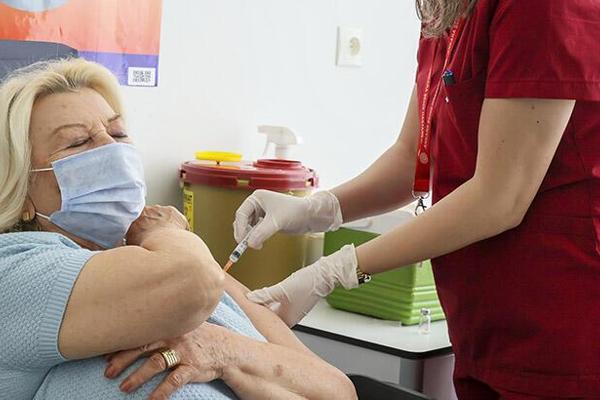Turkey aims to vaccinate nearly 53 million people by end May
ANKARA


Turkey will have a total of 105 million doses of the coronavirus injection by the end of May at the latest and will be able to vaccinate 52.5 million people by then, the country’s health minister has said, warning that variant-related infections are rising in some provinces.
Speaking after the Health Ministry’s Science Board meeting on Feb. 25, Fahrettin Koca said that the Turkey will initially receive 800,000 doses of the Pfizer/BioNTech vaccine out of the 4.5 million in 10 days, and efforts would be put to raise it to 5 million doses in total.
The country is currently using the vaccine developed by the Chinese pharmaceutical company Sinovac in its vaccination program, which was rolled out on Jan. 14.
To date, it has administered 8.2 million doses of the coronavirus jab. Nearly 7 million people received their first dose of the vaccine, while some 1.5 million got both doses.
The vaccine is administered in two doses and 28 days apart.
“Turkey is among the most successful countries on a global scale in terms of conducting the vaccinations. There is no supply or planning problem in the vaccination process and the second doses for all who have received the first dose of the vaccine are guaranteed,” Koca said.
At the press briefing, Koca also refuted claims by the main opposition Republican People’s Party (CHP) that Turkey gets the vaccines from China for free.
“In a world where there is a war for vaccines, would a manufacturer company donate vaccines to a country for free?” the minister asked.
“Under no circumstances has an additional amount of money been given to the intermediary firm,” he added.
Virus variants
There is no new coronavirus variant that originated in Turkey, but the rate of infections related to the U.K. strain is rising in the country, according to Koca.
One Brazilian and 49 South African variants of the coronavirus have been recorded in Turkey so far, the minister added.
He warned the public about the virus variants as the infections are increasing day by day, saying that the impact of the variants started to be seen in some parts of the country, singling out the provinces in the Black Sea region, such as Samsun and Ordu.
However, the minister ruled out a possibility of imposing a full lockdown.
“We are now in a period of prioritizing the normalization,” he said.
Koca recalled that the country will start taking measures based on on-site decisions depending on the pandemic outlook.
Under the government’s plan to gradually ease the virus-related restrictions starting in March, provinces will be categorized as low, medium, high and very high-risk based on infection rates and the vaccinations.
The minister also said that he would submit the Science Board’s recommendations on easing restrictions to the cabinet.
“President Recep Erdoğan may announce the steps to be taken following the cabinet meeting,” Koca added.
The cabinet is expected to meet next week on March 1.
